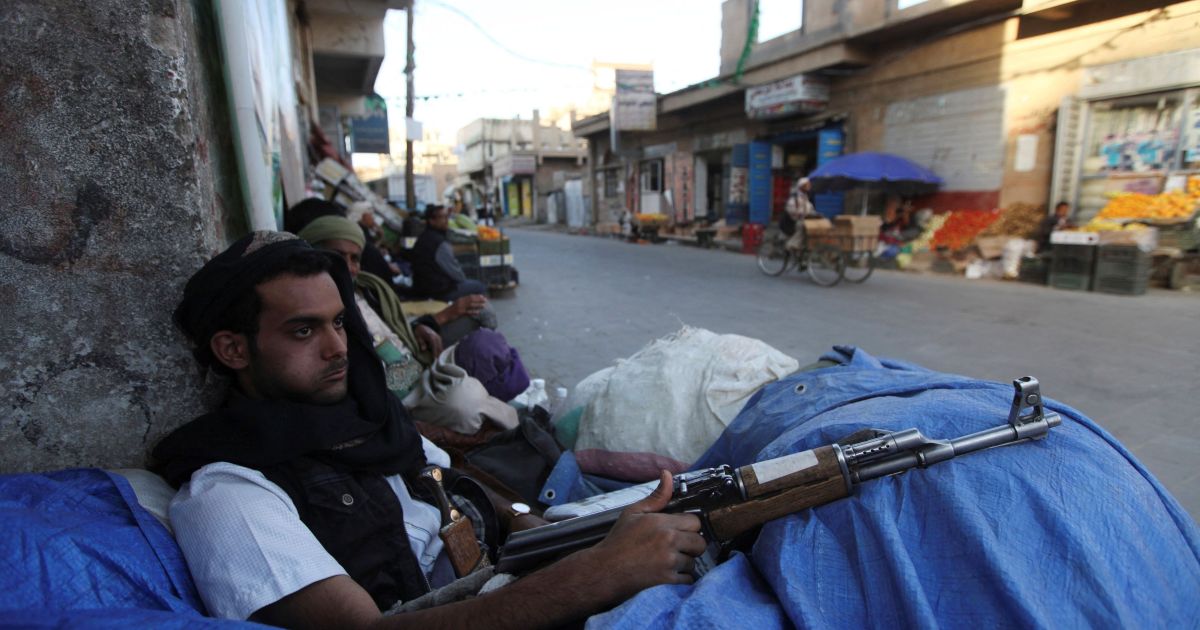President Biden mulling re-designating Houthis as ‘terrorist’ group

US President Joe Biden is considering putting the Houthis back on the US list of foreign ‘terrorist’ groups, one year after revoking the designation.
US President Joe Biden is considering re-designating Yemen’s Houthi rebels as an “international terrorist organisation” following a drone and missile attack on the United Arab Emirates (UAE) that were claimed by the group.
The announcement at a news conference on Wednesday came shortly after the UAE ambassador to the US, Yousef Al Otaiba, urged the Biden administration to restore the designation in response to Monday’s attack on Abu Dhabi that killed three people.
Last year, the US Department of State reversed a last-minute Trump administration decision, which put the Houthis on the US list of “foreign terrorist groups” and subjected them to sanctions, in order to facilitate the delivery of humanitarian assistance to Yemen.
Biden said reinstating the designation was “under consideration” but added that “it’s going to be very difficult” to end the conflict pitting the Houthis against Yemen’s internationally recognised government and a Saudi-led military coalition which the UAE belongs to.
UAE welcomes Biden’s comments
The UAE Embassy in the US welcomed Biden’s comments in a tweet, in which it accused the Houthis of “launching ballistic and cruise missiles against civilian targets, sustaining aggression, diverting aid to Yemeni people”.
The UAE welcomes @POTUS comments that Houthi return to terror list is under consideration. Case is clear—launching ballistic and cruise missiles against civilian targets, sustaining aggression, diverting aid from Yemeni people. (1/2)https://t.co/GgsCcGbheR — UAE Embassy US (@UAEEmbassyUS) January 19, 2022
On Wednesday, al-Otaiba said that missiles – and not just drones – had been used in the attack which targeted an Abu Dhabi National Oil Company fuel depot in an industrial zone outside Abu Dhabi, as well as an area of the airport still under construction.
“Several attacks – a combination of cruise missiles, ballistic missiles and drones – targeted civilian sites,” al-Otaiba said.
“Several were intercepted, a few of them didn’t and three innocent civilians, unfortunately, lost their lives,” he added in remarks at a virtual event hosted by the Jewish Institute for National Security of America.
Two Indians and one Pakistani national were killed and six people were wounded at the oil and gas facility when a fire caused fuel tanks to explode.
The Houthis said they fired five ballistic missiles and a number of explosive-laden drones aimed at the airports of Abu Dhabi and Dubai, the world’s busiest for international transits, as well as an oil refinery and other sensitive Emirati facilities.
There was no indication Dubai was hit in Monday’s attack.
In response, the Saudi-led coalition carried out air raids on Sanaa, the Houthi-held capital of Yemen, on Tuesday, killing at least 20 people, including civilians.
Yemen envoy heads to Gulf
The US special envoy for Yemen, Tim Lenderking, will head to the Gulf region this week to try and reinvigorate the peace process, the State Department said on Wednesday.
Lenderking “will press the parties to de-escalate militarily and seize the new year to participate fully in an inclusive UN-led peace process”, it said in a statement, focusing on the “urgent need to mitigate the dire humanitarian and economic crises facing Yemenis”.
On Wednesday, US Secretary of Defense Lloyd Austin underscored the US’s “unwavering support for the security and defense of UAE territory against all threats” in a call with Abu Dhabi Crown Prince Sheikh Mohammed bin Zayed al-Nahyan, the Pentagon said.
The UAE has called for the UN Security Council to weigh in on the attack.
UN Secretary-General Antonio Guterres has voiced concern regarding the coalition air attacks as well as condemned the attack on the UAE, his spokesman said.
The UAE was a key member of the Saudi-led coalition that entered Yemen’s civil war in 2015 after the Houthis had overrun Sanaa the previous year and overthrown the country’s president.






